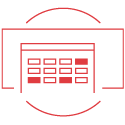Studying alongside your appointment
Take your next career step with us!

The Sensor Systems Engineering master's programme combines hardware, software and infrastructure aspects with design techniques and elements of the management of complex design processes. Through this interaction, results can be achieved that the individual elements cannot achieve in isolation. At the same time, this fact shows that graduates need to master management skills in addition to specialised areas of Engineering, Computer Science and Natural Sciences.
Master's programme for working professionals (MSc)
11700
90
Take your next career step with us!

All courses can be booked individually

Organise your own learning times

Organising electives
You largely determine the order of the modules and the number per semester yourself.
The School of Advanced Professional Studies (SAPS) is the joint centre for continuing academic education at Ulm University and Ulm University of Applied Sciences.
SAPS offers paid part-time master's programmes and microcredentials (certificate courses) in a blended learning format to optimally support part-time study.
The following qualifications can be obtained at SAPS: Microcredential, Certificate of Advanced Studies (CAS), Diploma of Advanced Studies (DAS) and Master of Science.
Our modern way of providing you with continuing education is blended learning, which combines didactically meaningful face-to-face events - which also serve as networking opportunities - with modern forms of e-learning. Our virtual desk with everything you need for learning is available to you online. Our microcredentials have a maximum of 20% synchronised events, which take place either at Ulm University or online.
Timo Schindler, Department Leader
I chose the Sensor Systems Engineering study/degree programme at Ulm University because it is not offered at any other university in southern Germany. The special feature is the constellation of part-time study (with a large proportion of online presence and few necessary attendance events at the University itself) and the combination of electronics and management topics on the basis of engineering. I particularly liked the relaxed atmosphere in the lectures and the spontaneity of the lecturers. Another important point for me when studying online is the quality of the lecture notes for the modules offered. All of the modules I attended met this requirement and I am sure that I will be able to benefit from this knowledge in the future. Ultimately, my focus was on compatibility with my appointment, which was more than optimised by the online lectures, the individual study time and the very high-quality scripts.
Welcome to the most liveable city in Germany. Albert Einstein's birthplace is a unique combination of science, leisure, top employers and culture. Top locations and events such as the Ulmer Zelt, Nabada or the Donaufest attract visitors to the quaint streets. Here you feel at home!
Copyright: City of Ulm